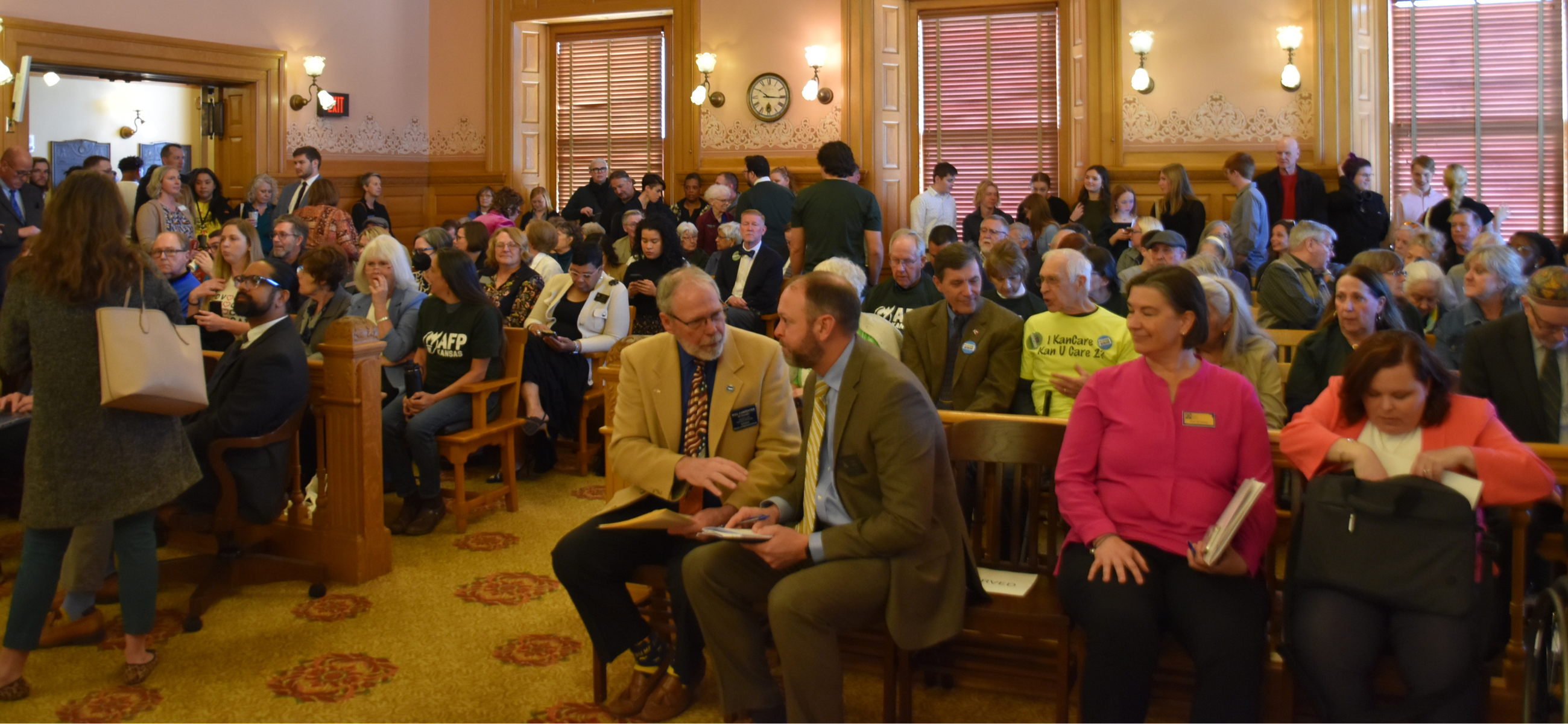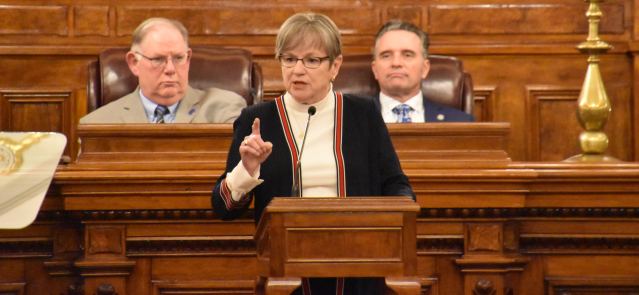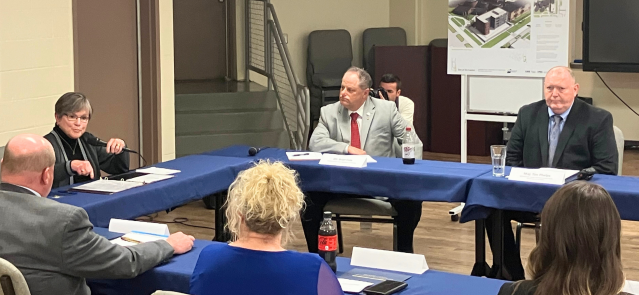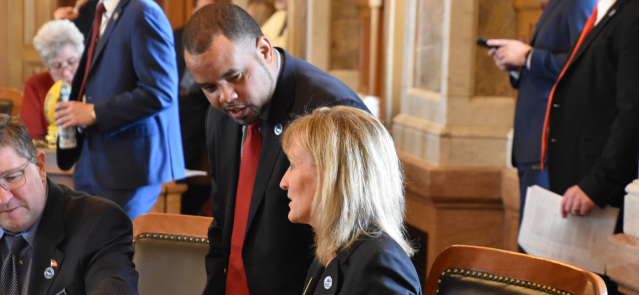Stay ahead of the curve as a political insider with deep policy analysis, daily briefings and policy-shaping tools.
Request a DemoMedicaid expansion takes big blow this week

Supporters and opponents of Medicaid expansion packed the old Supreme Court room March 20 for a joint Senate hearing. (Credit: Brett Stover)
While not exactly dead, the Medicaid expansion push took a big blow Thursday when the House Committee on Health and Human Services voted down a bill.
The blow came quickly, just a day after the Statehouse’s first expansion hearings since 2020.
Gov. Laura Kelly said in a statement that the committee’s vote was “disappointing,” but there are “still multiple avenues” for the Legislature to pass Medicaid expansion this session.
The Legislature has at least a couple of options.
A legislator could request to withdraw the bill from committee for a floor vote, which would take 70 votes in the House and 24 votes in the Senate.
A legislator also could propose an amendment to a bill being debated on the floor with a Medicaid expansion provision. Any proposal would have to rise past a likely challenge of germaneness before a potential vote.
If Medicaid expansion arrived on the floor via either of those avenues, the magic numbers would become 63 and 21. Those are the number of votes needed in the House and Senate to reach a simple majority.
Kelly’s contention throughout her push for Medicaid expansion is there are enough votes in both chambers to pass a bill if floor votes happened.
Assuming all Democrats — 11 in the Senate and 40 in the House — voted for Medicaid expansion, 10 Senate Republicans and 23 House Republicans are needed to get a majority.
We know from the governor’s previous news releases on this year’s bills that she has some Republican support: Sens. Brenda Dietrich, Topeka; John Doll, Garden City; and Carolyn McGinn, Sedgwick, and Reps. Susan Concannon, Beloit; and David Younger, Ulysses.
That would leave seven senators and 21 representatives needed.
Throughout the session, State Affairs has chatted with legislators on both sides of the aisle and the issue about expansion.
Those who are opposed don’t believe the votes are there.
“I never put anything up for a vote unless it’s going to pass,” House Speaker Dan Hawkins, R-Wichita, said in January after Kelly’s State of the State address. “You don’t ever see us put stuff out there just to watch it die.”
But even among supporters, the responses range from hopeful to doubtful regarding Kelly’s belief.
The problem remains that as more time passes since the last Medicaid votes, the greater the unknown current support. The most recent gauges of support come from 2017 and 2019.
In 2017, then-Gov. Sam Brownback vetoed a Medicaid expansion bill. In 2019, the House passed Medicaid expansion, but the Senate failed to pull the bill on the floor. Since then, the Legislature has considered whether to consider bills but not the merits of the policy itself.
Twelve Republicans who voted for expansion in 2017 and/or 2019 are still around — Concannon, Dietrich, Doll and McGinn, along with Sens. Rick Billinger, Goodland; Elaine Bowers, Concordia; Dan Kerschen, Garden Plain; Jeff Longbine, Emporia; Rick Wilborn, McPherson, and Reps. John Eplee, Atchison; Mark Schreiber, Emporia; and Adam Smith, Weskan.
If they all feel the same about Medicaid expansion in 2024, Kelly would still need two senators and 18 representatives to reach her goal.
Of course, time changes opinions.
Eplee is vice chairman of the House health committee that just rejected advancing the bill.
Wilborn and Smith previously told State Affairs that their past support involved protecting rural hospitals.
“I insist, before we pass any Medicaid expansion, that we have a feature that enhances the reimbursement rate to my rural hospitals,” Wilborn said in December.
The House’s budget plan including provisions to boost Medicaid reimbursement codes, in theory, could be enough for lawmakers like Wilborn and Smith not to go the expansion route.
Smith said in January he’s always told leadership he would vote for expansion “until I see a better option.”
“This is the first year I actually see some folks working toward a better option or an alternative to expansion,” he said.
Of course, the easiest way to determine whether legislators support Medicaid expansion is to simply vote on the matter. That’s what the governor wants. But can a miracle happen over the next two weeks? We’ll see.
Bryan Richardson is the managing editor at State Affairs Pro Kansas/Hawver’s Capitol Report. Reach him at [email protected] or on X @RichInNews.
X: @StateAffairsKS
Facebook: @stateaffairsks
LinkedIn: @stateaffairspro
Know the most important news affecting Kansas
Get our free weekly newsletter that covers government, policy and politics that impact your everyday life—in 5 minutes or less.
Unlimited Access: Subscribe for just $2.99/mo billed monthly.
Subscribe NowGet unlimited news access
Already a member? Login here
Kelly vetoes tax cut bill, proposes new package
Gov. Laura Kelly vetoed the tax cut package Wednesday, setting up an override attempt when the Legislature returns. Kelly said the bill was unsustainable and that Kansas “must be mindful of the fiscal mistakes of the previous administration” when providing tax relief. “While I appreciate the bipartisan effort that went into this tax cut package …
Amid final Medicaid Expansion push, Kelly visits Shawnee County jail
Making a final push for Medicaid expansion this session, Gov. Laura Kelly visited the Shawnee County Adult Detention Center on Tuesday. She met with Brian Cole, director of the Shawnee County Department of Corrections, Deputy Director Tim Phelps and others to explore how expansion could benefit local jails. Medicaid expansion “would mean a lot,” Cole …
Government entities converge for inaugural Child Welfare Summit
All three branches of government converged Monday in downtown Topeka for the inaugural Child Welfare Summit. The event, which organizers said drew about 750 people in person and virtually, centered on the framework of Kansas’ foster care system and the myriad challenges faced by those involved with child welfare services. Senate President Ty Masterson, R-Andover, said in opening remarks that the Legislature’s top priority is its handling of “children in need of care.” “Jesus himself said, ‘The poor are always …
Internet age-verification bill makes its way through House
Websites displaying pornography may soon be required to implement age-verification software to block Kansans under 18 from viewing its content. The age-verification requirement for Senate Bill 394, which received preliminary approval on the House floor Monday, is mandatory if one-fourth of the content displayed by a website for a calendar month is considered “harmful to …




